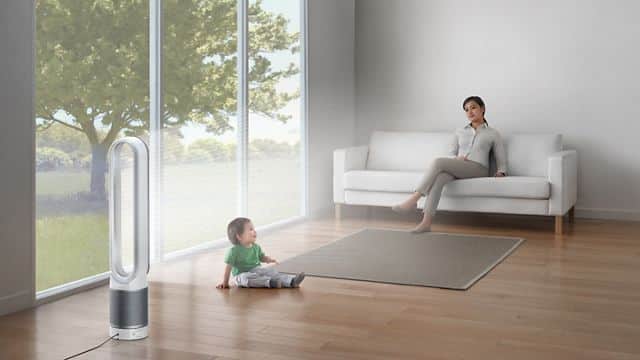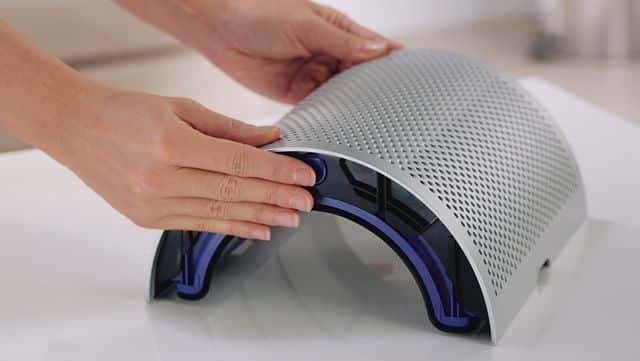The Dyson firm is a reputable producer of powerful air purifiers that are great for keeping a house free of dust and allergens. Are you a Dyson air purifier owner? If that is the case, you may have pondered whether you could use it to find mold spores in your home. Or which air filter kind is best?
Mold spores are eliminated by the newest Dyson air purifier models. Mold, however, is not directly detected by the air purifier. Instead, it draws the airborne spores into the HEPA filter, holds them there, and then blows clean, mold-free air back into your house.
Are you curious to find out more information about Dyson air purifiers? Maybe you’re trying to figure out which air purifier would get rid of mold and mildew the best. Or do you want to know if you can leave your air purifier on all the time?
Can Mold Be Removed By A Dyson Air Purifier?

Dyson claims that air purifiers do remove mold spores from the air, but only if the air purifier is placed in a room with mold spores.
Please be aware that running your air purifiers continually on the first or second floors will not eliminate or solve the mold problems in your basement if there is mold there. Rather, it will assist in maintaining clean air in the spaces where Dyson’s clean air output is flowing.
With HEPA filters, remote, and Wi-Fi controls on every Dyson air purifier model, using the device is as simple as touching an app on your phone. Additionally, you will receive air quality reports that detail the interior air quality of your house, along with graphs that show the quantities of dust, harmful pollutants, and pollen that have been eliminated.
HEPA Filters’ Advantages

Let’s say you or a loved one has asthma or allergies. The high-quality HEPA filter used in the production of Dyson fans with air purifiers is designed to capture 99.7% of allergens and pollutants, even those as small as 0.3 microns.
The interior of your home will become a haven free of polluted air thanks to the HEPA filter’s ability to filter out all gases, aromas, household pollutants, and formaldehyde.
A Dyson air purifier is a smart purchase for individuals on a tight budget who want to enhance their quality of life and health. Additionally, a Dyson manufacturing guarantee to repair or replace any defective components during the first two years of ownership protects your investment.
Which Air Purifier Is Best For Mold Spores?
Are you worried that mold spores may be present in your home? If true, the health of people is endangered by those tiny invisible spores. In reality, according to the CDC, exposure to mold can lead to a number of health problems, the most common of which are runny noses, wheezing, and red or itchy eyes and skin.
People who have been diagnosed with asthma or mold allergies are particularly vulnerable to experiencing more severe health issues such hypersensitivity pneumonitis, fever, and shortness of breath after being exposed to mold for an extended period of time.
Because science has shown that HEPA filters do remove and trap mold spores inside the dry and sterile filter, the specialists at Air Purifiers advise buying an air purifier with a HEPA filter. Molds and mildews also produce an offensive odor that permeates the air within buildings. To get rid of odors and spores, think about getting an air purifier with both a charcoal and a HEPA filter.
The Alen 45i Air Purifier with HEPA filters is a wonderful alternative for household use to get rid of allergies, mold spores, particles of dust, and pet dander, according to the Air Purifiers researchers.
Can I always Have My Dyson Air Purifier On?

The auto fan feature on Dyson air purifiers is designed to control the air quality in your house or place of business. This Dyson function keeps track of the interior air quality and only activates the air purification system when it’s necessary to uphold standards for healthy indoor air.
The cutting-edge air purifiers from Dyson not only eliminate airborne contaminants, but they also have voice control and are connected to an app. If you were on vacation, you could use the Dyson app to control the air quality in your house from a different continent.
Let’s say you have an air purifier from a different company. Allowing the appliance to operate continually in your house has a number of benefits. Having the cleanest air possible may enhance your quality of life, especially during seasons when allergens and pollens are at an all-time high or if you have a respiratory condition.
Here are some benefits of leaving an air purifier running nonstop:
- The aroma inside is more enticing.
- Continual odor removal from cooking
- makes airflow better
- less pollutants inside
- Before bacteria may stick to surfaces, they are eliminated from the air.
Which Air Purifier Type Is Best For Mold And Mildew?
Doctors and specialists in air quality agree that an air purifier with a HEPA filter is the best filter for eradicating molds and mildews. Additionally, the HEPA filters have U.S. certification. Department of Energy to get rid of 0.3 micron-sized particles 99.97 percent of the time. Mold spores and molecules are typically smaller than 0.3 microns, making it simple to remove them from the air and trap them inside the HEPA filter.
Remember that mildew is a sort of mold, which is a fungus that feeds on decaying stuff. Simply put, molds are a destructive force in your house and a dangerous fungus to human health.
Basements, drywall, and woodwork can all be destroyed by these minute but deadly spores.
Mold spores can only develop in moist environments; the HEPA filter’s dryness prevents this from happening. Molds die and are unable to spread after passing through the HEPA filter.
Additional Reflections
Write down a short list of the attributes your ideal air purifier should have before you start purchasing, then compare models online. Or, for more information, go to a physical store to see the appliance displays.
Read consumer reviews on YouTube as well as the websites of major retailers. Reading what other customers have to say about a product, particularly about its benefits and drawbacks, is one of the finest methods to learn about it.
Ask your doctor or respiratory therapist for recommendations if you’re buying an air purifier for respiratory health reasons. Before spending your money on a new appliance, it is usually a good idea to get professional advice on matters that have an impact on your general health.
Conclusion
Dyson air purifiers are an investment in the safety of you and your loved ones’ indoor air quality. In addition, an air purifier can assist minimize dust, which can ease the maintenance of your home.






GIPHY App Key not set. Please check settings